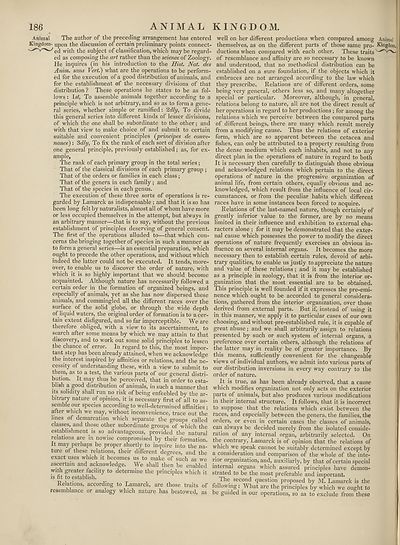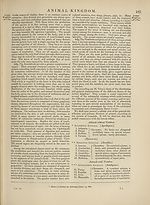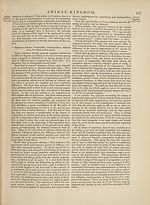Encyclopaedia Britannica > Volume 3, Anatomy-Astronomy
(194) Page 186
Download files
Complete book:
Individual page:
Thumbnail gallery: Grid view | List view

186 ANIMAL
Animal The author of the preceding arrangement has entered
Kingdom. Up0n the discussion of certain preliminary points connect-
eel with the subject of classification, which may be regard¬
ed as composing the art rather than the science of Zoology.
He inquires (in his introduction to the Hist. Nat. des
Anim. sans Vert.) what are the operations to be perform¬
ed for the execution of a good distribution of animals, and
for the establishment of the necessary divisions of that
distribution? These operations he states to be as fol¬
lows : ls£, To assemble animals together according to a
principle which is not arbitrary, and so as to form a gene¬
ral series, whether simple or ramified: 2dly, To divide
this general series into different kinds of lesser divisions,
of which the one shall be subordinate to the other; and
with that view to make choice of and submit to certain
suitable and convenient principles (principes de conve-
nance): 2>dly, To fix the rank of each sort of division after
one general principle, previously established; as, for ex¬
ample.
The rank of each primary group in the total series;
That of the classical divisions of each primary group ;
That of the orders or families in each class;
That of the genera in each family ; and
That of the species in each genus.
The execution of these three sorts of operations is re¬
garded by Lamarck as indispensable ; and that it is so has
been long felt by naturalists, almost all of whom have more
or less occupied themselves in the attempt, but always in
an arbitrary manner—that is to say, without the previous
establishment of principles deserving of general consent.
The first of the operations alluded to—that which con¬
cerns the bringing together of species in such a manner as
to form a general series—is an essential preparation, which
ought to precede the other operations, and without which
indeed the latter could not be executed. It tends, more¬
over, to enable us to discover the order of nature, with
which it is so highly important that we should become
acquainted. Although nature has necessarily followed a
certain order in the formation of organized beings, and
especially of animals, yet as she has now dispersed these
animals, and commingled all the different races over the
surface of the solid globe, or through the wide depth
of liquid waters, the original order of formation is to a cer¬
tain extent disfigured, and so far imperceptible. We are
therefore obliged, with a view to its ascertainment, to
search after some means by which we may attain to that
discovery, and to work out some solid principles to lessen
the chance of error. In regard to this, the most impor¬
tant step has been already attained, when we acknowledge
the interest inspired by affinities or relations, and the ne¬
cessity of understanding these, with a view to submit to
them, as to a test, the various parts of our general distri¬
bution. It may thus be perceived, that in order to esta¬
blish a good distribution of animals, in such a manner that
its solidity shall run no risk of being enfeebled by the ar¬
bitrary nature of opinion, it is necessary first of all to as¬
semble our species according to well-determined affinities ;
after which we may, without inconvenience, trace out the
lines of demarcation which separate the groups called
classes, and those other subordinate groups of which the
establishment is so advantageous, provided the natural
relations are in nowise compromised by their formation.
It may perhaps be proper shortly to inquire into the na¬
ture of these relations, their different degrees, and the
exact uses which it becomes us to make of such as we
ascertain and acknowledge. We shall then be enabled
with greater facility to determine the principles which it
is fit to establish.
Relations, according to Lamarck, are those traits of
resemblance or analogy which nature has bestowed, as
KINGDOM.
well on her different productions when compared among Animal
themselves, as on the different parts of those same pro- Kingdom,
ductions when compared with each other. These traits
of resemblance and affinity are so necessary to be known
and understood, that no methodical distribution can be
established on a sure foundation, if the objects which it
embraces are not arranged according to the law which
they prescribe. Relations are of different orders, some
being very general, others less so, and many altogether
special or particular. Moreover, although, in general,
relations belong to nature, all are not the direct result of
her operations in regard to her productions ; for among the
relations which we perceive between the compared parts
of different beings, there are many which result merely
from a modifying cause. Thus the relations of exterior
form, which are so apparent between the cetacea and
fishes, can only be attributed to a property resulting from
the dense medium which each inhabits, and not to any
direct plan in the operations of nature in regard to both
It is necessary then carefully to distinguish those obvious
and acknowledged relations which pertain to the direct
operations of nature in the progressive organization of
animal life, from certain others, equally obvious and ac¬
knowledged, which result from the influence of local cir¬
cumstances, or from the peculiar habits which different
races have in some instances been forced to acquire.
Relations of the last-named nature, though certainly of
greatly inferior value to the former, are by no means
limited in their influence and exhibition to external cha¬
racters alone ; for it may be demonstrated that the exter¬
nal cause which possesses the power to modify the direct
operations of nature frequently exercises an obvious in¬
fluence on several internal organs. It becomes the more
necessary then to establish certain rules, devoid of arbi¬
trary qualities, to enable us justly to appreciate the nature
and value of these relations; and it may be established
as a principle in zoology, that it is from the interior or¬
ganization that the most essential are to be obtained.
This principle is well founded if it expresses the pre-emi¬
nence which ought to be accorded to general considera¬
tions, gathered from the interior organization, over those
derived from external parts. But if, instead of using it
in this manner, we apply it to particular cases of our own
choosing, and without pre-established rule, it is capable of
great abuse; and we shall arbitrarily assign to relations
presented by such or such system of internal organs, a
preference over certain others, although the relations of
the latter may in reality be of greater importance. By
this means, sufficiently convenient for the changeable
views of individual authors, we admit into various parts of
our distribution inversions in every way contrary to the
order of nature.
It is true, as has been already observed, that a cause
which modifies organization not only acts on the exterior
parts of animals, but also produces various modifications
in their internal structure. It follows, that it is incorrect
to suppose that the relations which exist between the
races, and especially between the genera, the families, the
orders, or even in certain cases the classes of animals,
can always be decided merely from the isolated conside¬
ration of any internal organ, arbitrarily selected. On
the contrary, Lamarck is of opinion that the relations of
which we speak cannot be suitably determined except by
a consideration and comparison of the whole of the inte¬
rior organization, and, auxiliarly, by that of certain special
internal organs which assured principles have demon¬
strated to be the most preferable and important.
The second question proposed by M. Lamarck is the
following : What are the principles by which we ought to
be guided in our operations, so as to exclude from these
Animal The author of the preceding arrangement has entered
Kingdom. Up0n the discussion of certain preliminary points connect-
eel with the subject of classification, which may be regard¬
ed as composing the art rather than the science of Zoology.
He inquires (in his introduction to the Hist. Nat. des
Anim. sans Vert.) what are the operations to be perform¬
ed for the execution of a good distribution of animals, and
for the establishment of the necessary divisions of that
distribution? These operations he states to be as fol¬
lows : ls£, To assemble animals together according to a
principle which is not arbitrary, and so as to form a gene¬
ral series, whether simple or ramified: 2dly, To divide
this general series into different kinds of lesser divisions,
of which the one shall be subordinate to the other; and
with that view to make choice of and submit to certain
suitable and convenient principles (principes de conve-
nance): 2>dly, To fix the rank of each sort of division after
one general principle, previously established; as, for ex¬
ample.
The rank of each primary group in the total series;
That of the classical divisions of each primary group ;
That of the orders or families in each class;
That of the genera in each family ; and
That of the species in each genus.
The execution of these three sorts of operations is re¬
garded by Lamarck as indispensable ; and that it is so has
been long felt by naturalists, almost all of whom have more
or less occupied themselves in the attempt, but always in
an arbitrary manner—that is to say, without the previous
establishment of principles deserving of general consent.
The first of the operations alluded to—that which con¬
cerns the bringing together of species in such a manner as
to form a general series—is an essential preparation, which
ought to precede the other operations, and without which
indeed the latter could not be executed. It tends, more¬
over, to enable us to discover the order of nature, with
which it is so highly important that we should become
acquainted. Although nature has necessarily followed a
certain order in the formation of organized beings, and
especially of animals, yet as she has now dispersed these
animals, and commingled all the different races over the
surface of the solid globe, or through the wide depth
of liquid waters, the original order of formation is to a cer¬
tain extent disfigured, and so far imperceptible. We are
therefore obliged, with a view to its ascertainment, to
search after some means by which we may attain to that
discovery, and to work out some solid principles to lessen
the chance of error. In regard to this, the most impor¬
tant step has been already attained, when we acknowledge
the interest inspired by affinities or relations, and the ne¬
cessity of understanding these, with a view to submit to
them, as to a test, the various parts of our general distri¬
bution. It may thus be perceived, that in order to esta¬
blish a good distribution of animals, in such a manner that
its solidity shall run no risk of being enfeebled by the ar¬
bitrary nature of opinion, it is necessary first of all to as¬
semble our species according to well-determined affinities ;
after which we may, without inconvenience, trace out the
lines of demarcation which separate the groups called
classes, and those other subordinate groups of which the
establishment is so advantageous, provided the natural
relations are in nowise compromised by their formation.
It may perhaps be proper shortly to inquire into the na¬
ture of these relations, their different degrees, and the
exact uses which it becomes us to make of such as we
ascertain and acknowledge. We shall then be enabled
with greater facility to determine the principles which it
is fit to establish.
Relations, according to Lamarck, are those traits of
resemblance or analogy which nature has bestowed, as
KINGDOM.
well on her different productions when compared among Animal
themselves, as on the different parts of those same pro- Kingdom,
ductions when compared with each other. These traits
of resemblance and affinity are so necessary to be known
and understood, that no methodical distribution can be
established on a sure foundation, if the objects which it
embraces are not arranged according to the law which
they prescribe. Relations are of different orders, some
being very general, others less so, and many altogether
special or particular. Moreover, although, in general,
relations belong to nature, all are not the direct result of
her operations in regard to her productions ; for among the
relations which we perceive between the compared parts
of different beings, there are many which result merely
from a modifying cause. Thus the relations of exterior
form, which are so apparent between the cetacea and
fishes, can only be attributed to a property resulting from
the dense medium which each inhabits, and not to any
direct plan in the operations of nature in regard to both
It is necessary then carefully to distinguish those obvious
and acknowledged relations which pertain to the direct
operations of nature in the progressive organization of
animal life, from certain others, equally obvious and ac¬
knowledged, which result from the influence of local cir¬
cumstances, or from the peculiar habits which different
races have in some instances been forced to acquire.
Relations of the last-named nature, though certainly of
greatly inferior value to the former, are by no means
limited in their influence and exhibition to external cha¬
racters alone ; for it may be demonstrated that the exter¬
nal cause which possesses the power to modify the direct
operations of nature frequently exercises an obvious in¬
fluence on several internal organs. It becomes the more
necessary then to establish certain rules, devoid of arbi¬
trary qualities, to enable us justly to appreciate the nature
and value of these relations; and it may be established
as a principle in zoology, that it is from the interior or¬
ganization that the most essential are to be obtained.
This principle is well founded if it expresses the pre-emi¬
nence which ought to be accorded to general considera¬
tions, gathered from the interior organization, over those
derived from external parts. But if, instead of using it
in this manner, we apply it to particular cases of our own
choosing, and without pre-established rule, it is capable of
great abuse; and we shall arbitrarily assign to relations
presented by such or such system of internal organs, a
preference over certain others, although the relations of
the latter may in reality be of greater importance. By
this means, sufficiently convenient for the changeable
views of individual authors, we admit into various parts of
our distribution inversions in every way contrary to the
order of nature.
It is true, as has been already observed, that a cause
which modifies organization not only acts on the exterior
parts of animals, but also produces various modifications
in their internal structure. It follows, that it is incorrect
to suppose that the relations which exist between the
races, and especially between the genera, the families, the
orders, or even in certain cases the classes of animals,
can always be decided merely from the isolated conside¬
ration of any internal organ, arbitrarily selected. On
the contrary, Lamarck is of opinion that the relations of
which we speak cannot be suitably determined except by
a consideration and comparison of the whole of the inte¬
rior organization, and, auxiliarly, by that of certain special
internal organs which assured principles have demon¬
strated to be the most preferable and important.
The second question proposed by M. Lamarck is the
following : What are the principles by which we ought to
be guided in our operations, so as to exclude from these
Set display mode to:
![]() Universal Viewer |
Universal Viewer | ![]() Mirador |
Large image | Transcription
Mirador |
Large image | Transcription
Images and transcriptions on this page, including medium image downloads, may be used under the Creative Commons Attribution 4.0 International Licence unless otherwise stated. ![]()
| Encyclopaedia Britannica > Encyclopaedia Britannica > Volume 3, Anatomy-Astronomy > (194) Page 186 |
|---|
| Permanent URL | https://digital.nls.uk/193759870 |
|---|
| Attribution and copyright: |
|
|---|---|
| Shelfmark | EB.16 |
|---|---|
| Description | Ten editions of 'Encyclopaedia Britannica', issued from 1768-1903, in 231 volumes. Originally issued in 100 weekly parts (3 volumes) between 1768 and 1771 by publishers: Colin Macfarquhar and Andrew Bell (Edinburgh); editor: William Smellie: engraver: Andrew Bell. Expanded editions in the 19th century featured more volumes and contributions from leading experts in their fields. Managed and published in Edinburgh up to the 9th edition (25 volumes, from 1875-1889); the 10th edition (1902-1903) re-issued the 9th edition, with 11 supplementary volumes. |
|---|---|
| Additional NLS resources: |
|

